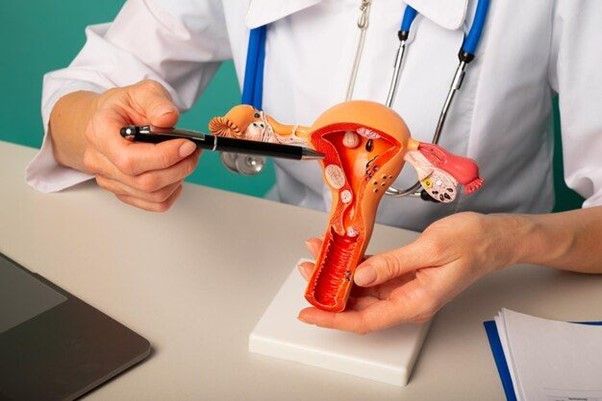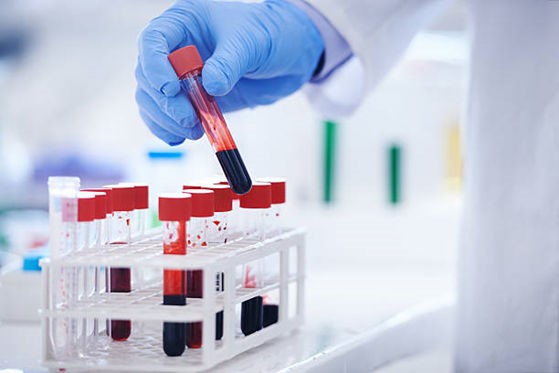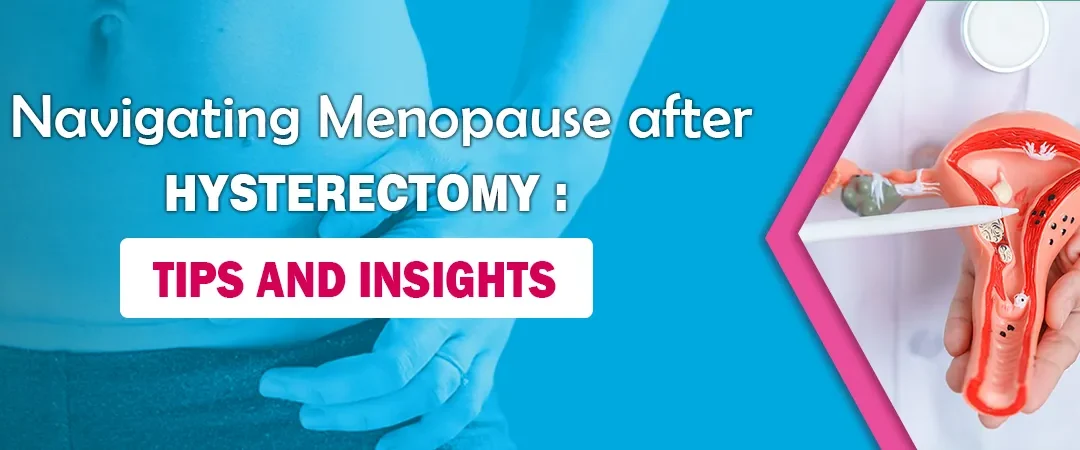Hysterectomy is a surgical procedure to remove a woman’s uterus. The doctor may recommend a hysterectomy for treating medical conditions or reproductive health concerns. Hysterectomy can cause hormonal imbalance, particularly a decrease in estrogen levels. Such hormonal changes may cause menopause after hysterectomy.

Are you facing menopause after a hysterectomy? Please consult distinguished gynecologist Dr. Himali Maniar at Nisha Women’s Hospital. Dr. Maniar can provide expert care in recovering from hysterectomy and its effects.
With nearly 10 years of experience, Dr. Maniar is often called the best gynecologist in South Bopal, Ahmedabad.
Take the first step towards a smoother transition and improved quality of life.
Causes Of Menopause After Hysterectomy
Menopause after a partial hysterectomy and total hysterectomy can differ based on the extent of the surgery:
Menopause after Partial Hysterectomy:
- Uterus Removal: In a partial hysterectomy, the doctor removes only the uterus, while the cervix is left intact.
- Ovarian Function: If the ovaries are not removed during the partial hysterectomy, hormonal changes may not be as abrupt. Menopause may occur naturally, but the timing can still vary. This means you may experience menopause years after hysterectomy.
Menopause after Total Hysterectomy:
-
- Uterus and Cervix Removal: In a total hysterectomy, both the uterus and cervix are removed. The doctor may also remove the ovaries and fallopian tubes.
- Ovarian Function Impact: If the ovaries are removed during a total hysterectomy, menopause typically occurs more abruptly. This is because it immediately stops ovarian hormone production.
- “A total hysterectomy with removal of the ovaries often results in a more abrupt onset of menopause,” explains Dr. Himali Maniar. “This is due to the sudden hormonal changes caused by ovary removal.”
Dr. Maniar is a highly respected doctor known for her expertise in laparoscopic hysterectomy in Ahmedabad.
Now, let’s understand how you can detect if you are experiencing menopause after hysterectomy.
Signs Of Menopause After Hysterectomy
As mentioned earlier, menopause begins almost immediately if the doctor removes the ovaries. The symptoms of menopause after a partial hysterectomy begin at a similar time as they would have without the surgery.
Signs of menopause after a hysterectomy can include:
-
- Hot Flashes: Hot flashes are sudden, intense feelings of warmth. They can cause sweating and redness of the skin and often affect the upper body and face.
- Mood Swings: Menopause can bring about mood swings, irritability, and changes in emotional well-being. Some women experience heightened emotional sensitivity during this time.
- Vaginal Dryness: Reduced estrogen levels can lead to vaginal dryness. This can cause discomfort, itching, or pain during sexual intercourse.
- Sleep Problems: Many women may have difficulty falling asleep or staying asleep. Sleep problems can lead to fatigue and daytime sleepiness.
- Irregular Periods: If the ovaries are still present, they may continue to produce hormones for some time. This can result in irregular periods or spotting.
- Weight Changes: Some women may notice weight gain, particularly in the abdominal area, as hormonal changes can affect metabolism and fat distribution.
- Bone Health: Menopause-related hormonal changes can increase the risk of bone loss (osteoporosis). It’s essential to discuss bone health and consider bone density testing with your healthcare provider.
Are you experiencing any of these menopause symptoms after hysterectomy? Please speak with Dr. Himali Maniar, an expert lady gynecologist in Bopal. She can help you manage these symptoms effectively and improve your overall quality of life during this transition.
Understanding menopausal symptoms is crucial. However, it’s essential to consider specific criteria and medical assessments to diagnose menopause accurately.
Diagnosing Menopause After Hysterectomy
Diagnosing menopause after a hysterectomy typically involves considering the following factors:
- Symptoms: Common menopausal symptoms like hot flashes, mood swings, vaginal dryness, and irregular periods can indicate the onset of menopause.
- Blood Tests: Blood tests measuring hormone levels, particularly FSH (Follicle-Stimulating Hormone) and estradiol, can help confirm menopause. In menopause, FSH levels are usually elevated, and estradiol levels are low.

- Tracking Periods:If your ovaries were not removed, you may continue to have irregular periods for some time. The absence of periods for at least 12 consecutive months is often considered a reliable indicator of menopause.
- Medical History: A comprehensive medical history, including details of the hysterectomy and any previous symptoms, can provide valuable information.
- Physical Examination: A physical examination, including an assessment of vaginal health, may be conducted to check for signs of vaginal dryness and atrophy.
- Bone Density Testing: Due to the increased risk of bone loss during menopause, bone density testing may be recommended to assess bone health.
- Thyroid Function: The doctor may perform thyroid function tests to rule out thyroid-related causes of symptoms, which can mimic menopausal symptoms.
Please visit the competent gynecologist, Dr. Himali Maniar, to confirm the onset of menopause and provide appropriate guidance for symptom management.
Managing menopause symptoms effectively is crucial for a comfortable and fulfilling life during this transition. So, let’s dive into these valuable insights to ensure your journey through menopause is as smooth as possible.
Managing Menopause After Hysterectomy
- Hormone Replacement Therapy (HRT): HRT involves taking estrogen and, if necessary, progesterone to alleviate menopausal symptoms. It may not be recommended for those at risk of certain health conditions.
- Non-Hormonal Therapies: Non-hormonal medications and therapies, such as selective serotonin reuptake inhibitors (SSRIs), can help manage mood swings and hot flashes.
- Vaginal Estrogen: For vaginal dryness and discomfort during intercourse, your doctor may prescribe topical estrogen creams or rings.
- Lifestyle Changes: A balanced diet, regular exercise, and stress management can make you feel better during menopause.

- Bone Health: Doctors may recommend calcium and vitamin D supplements to address the increased risk of bone loss. They may also suggest weight-bearing exercises.
- Emotional Support: It’s important to seek emotional support through counseling or support groups. This can help cope with the dynamic changes associated with menopause.
- Regular Check-Ups: Ongoing medical check-ups are essential to monitor overall health and address potential concerns.
The menopause treatment plan should be individualized, considering your specific symptoms, health history, and preferences. Dr. Himali Maniar can provide strategies to help you navigate menopause with confidence and ease.
Conclusion
Hysterectomy menopause is a significant life change that can bring about various changes. Understanding the symptoms and seeking support can make this journey more manageable. Please remember that you’re not alone in healing from hysterectomy.

Please visit the best gynecologist in South Bopal, Ahmedabad, Dr. Himali Maniar. She can provide valuable insights to help have a healthier menopausal transition.
Take the first step towards better health and well-being. Schedule a consultation with Dr. Maniar today.
Your journey to healing after hysterectomy begins with compassionate guidance and care.
FAQs
Q.1 Is menopause worse after hysterectomy?
Menopause can feel more sudden and intense after a hysterectomy. This is especially true if the ovaries are also removed, leading to an abrupt hormonal change.
Q.2 Can you have problems with your ovaries after a hysterectomy?
Yes, there can be issues with the ovaries after a hysterectomy. Ovarian cysts or other conditions may still affect them.
Q.3 Do periods continue after hysterectomy?
Periods should stop after a hysterectomy because of the absence of a uterus. But, hormonal changes may cause irregular bleeding or spotting if the ovaries remain.
Q.4 How can I prevent menopause after hysterectomy?
You cannot prevent menopause after a hysterectomy. Hysterectomy involves removing the uterus and sometimes the ovaries. But hormone replacement therapy (HRT) can help manage menopausal symptoms in some cases.

